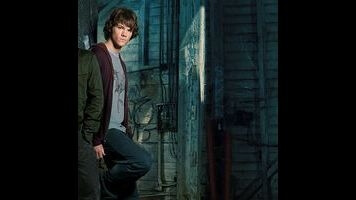Supernatural: “Hunteri Heroici”

Supernatural often works best when it manages to be funny without abandoning its sense of menace, and the show is often funniest when it goes for pop culture parodies that wouldn’t look out of place in an episode of Sledge Hammer! “Hunteri Heroici”—one of the best jokes was the explanation of the title—might be the most overtly parodic episode since the brothers were trapped inside “TV Land” a few years ago. It earns its laughs with the smarts it brings to deconstructing the target at hand, animated cartoons. But it also manages to keep a firm grip on something more emotionally affecting than mere scariness. From the opening scene, in which a man engaged in a nervous rendezvous with his lover has his heart literally pop out of his chest, leaving a valentine-shaped hole in his body, there’s something lonely and sad pulsing beneath the bright, playful surface.
I don’t know whether this was by design or just one of those fluky things, but parts of the episode suggested a homage to the Joe Dante/Sally Cruikshank “It’s A Good Life,” the version of the story about the kid who wishes people into the cornfield that appeared in the 1983 Twilight Zone movie. But instead of a little boy remaking the world to suit himself, “Hunteri Heroici” is about a old man (Mike Farrell) who, with his faculties deserting him, has retreated into the well-worn pleasures of childhood. A resident of an old-age home, Farrell spends his days parked in front of the TV, staring at cartoons in a haze of senile dementia. Because he’s a powerfully telekinetic old man, this presents a problem: With his conscious mind lost in the mists, his uncontrolled powers set up a zone surrounding him, where things operate according to Toon Town laws. Having figured this out, the head of the home has been taking him along on bank robberies. Black holes are slapped onto the sides of walls to provide an instant entrance, guards are flattened beneath huge anvils labeled “1 TON,” etc.
The fact that Castiel is along for the ride adds to the fun. (Having announced that he will not serve mankind by working as a hunter, he proudly declared himself to be Sam and Dean’s third wheel. Sam, in his special, self-appointed role as vocabulary nanny, tells him that the term “third wheel” isn’t supposed to be complimentary, but Cas tells him that he must be mistaken: A third wheel “adds extra grip and greater stability.” As sometimes happens when Cas is arguing the logic of our mortal ways, he makes an excellent case.) Cas got to react to a mention of Bugs Bunny by asking if they were now “looking for some insect-rodent hybrid,” and his monologue explicating the religious underpinnings of Road Runner cartoons—“The bird represents God. The coyote is man, endlessly chasing the divine”—ought to get him a job writing for The A.V. Club.
The funny stuff serves to make the poignant stuff that much more painful. Early on, Cas explains that he wants to remake himself as a hunter—which is what he’s been, more often than not, since he first got mixed up with the Winchesters, but what the hell—because he’s done with Heaven: “I don’t want anything to do with that place. Not anymore.” He sounds like someone who’s gone through a bad breakup and now hates the Dairy Queen where he and his ex-wife used to share a cone, but as he finally admits, he can’t go home again because he can’t bear the thought of seeing what the place is like since he laid waste to it; seeing Earth again is bad enough. After Cas has healed Farrell’s catatonic dementia, he recognizes him as a kindred spirit, and realizes that they’ve both been using childish fantasy to drown out the sound of their own internal screaming.
The ending is soft: The situation practically demands that Farrell be killed, partly as redemption for what his powers have been doing and partly to make sure it never happens again. Farrell himself seems to be ready for it, and his performance is good enough that it’s a shame that, instead of rewarding him with an Emmy-worthy death scene, the show settles for Cas “neutralizing” him by weaning him off cartoons and sticking some Beethoven on permanent repeat inside his skull. There’s more punch to the conclusion of the series of flashbacks to Sam meeting his girlfriend’s hard-case father. I’ve pretty much stopped waiting for the revelation that this whole storyline is a false memory planted in Sam’s brain by some Leviathan trickster-troll king, which makes it all the more disturbing that the scenes continue to feel dreamlike, in a creepy way: Everything about them somehow keeps you primed, waiting for the other shoe to drop. As for Kevin Tram and his mom, they’re mentioned once, at the beginning, as an excuse for a throwaway joke. I’ve sometimes been less than mesmerized by the ongoing story that was meant to hold a season of Supernatural together, but I can’t remember another season when the show itself seemed less interested in it. The show does its best to pretend to be going somewhere, but its real focus this season is on where the characters have been, and what they were up to when we weren’t watching them.
Stray observations:
- Cas’ Columbo impression has been out there waiting to happen for a long time. It wasn’t very good, but that seems all the more reason to be grateful that it finally happened, and we can all move on now.